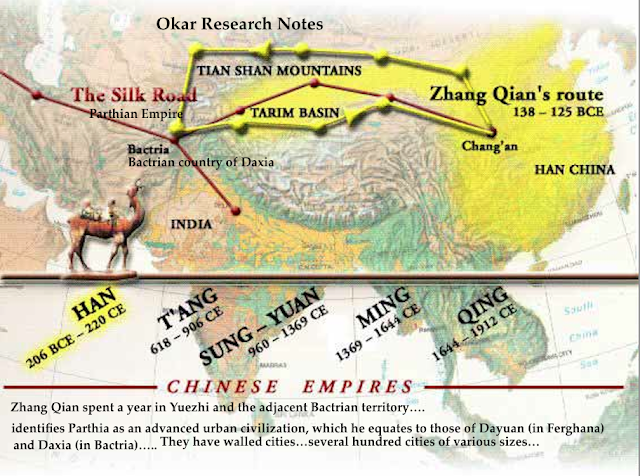Click Here to View the Main Index
Email....okarresearch@gmail.com
Zhang Qian (Chinese explorer ...c 130 BCE) He was an imperial envoy to the outside world in the 2nd century BC, during the time of the Han Dynasty who traveled along the Silk Road....the most famous of the Han emperors, Wu-ti (140-87 BCE). As part of his aggressive policy toward the Xiongnu, he sent Zhang Qian (Chang K'ien) on a mission to Inner Asia, to explore the possibilty of a Han alliance with other nomadic states such as the Yueh-chih. Zhang Qian's mission, which took a decade and a half to complete, marks an important stage in the development of Han political and economic relations with Inner Asia. His reports regarding the countries to the West were used as sources for later compilations of political and economic intelligence (such as the "Description of the Western Regions") and stimulated the development of the "Silk Road.".....http://depts.washington.edu/silkroad/texts/hantxt1.html
Click on the map to enlarge
"Ta-hia [Bactria] is more than 2000 li to the southwest of Ta-yuan, on the south bank of the K'ui-shui [Oxus]. The people have fixed abodes and live in walled cities and regular houses like the people of Ta-yuan. They have no great king or chief, but everywhere the cities and towns have their own petty chiefs. While the people are shrewd traders, their soldiers are weak and afraid to fight, so that, when the Ta-yue-chi migrated westward, they made war on the Ta-hia, who became subject to them. The population of Ta-hia may amount to more than a million. Their capital is called Balka, and it has markets for the sale of all sorts of merchandise. Furthermore, we find that a number of Buddhist religious centers flourish near the town which evidently serves as a pilgrimage center for leaders from far away. When I was in Ta-hia, I saw there sticks of bamboo of Kiung [in China] and some cloth [silk] of Shu. When I asked the inhabitants of Ta-hia how they had obtained possession of these, they replied: "The inhabitants of our country buy them in Shon-tu [India] and the „tribes‟ north of Burma, he reports, might be a better route, because the merchants from Shu sometimes went there with their goods on unofficial trading missions."...... http://mrgoethals.weebly.com/uploads/1/6/5/4/16542680/world_history_lesson_20_-_afro eurasian_trade_patterns_before_600_ce_primary_sources.pdf
"Dayuan (Ta-yuan; Chinese: 大宛; pinyin: Dàyuān; literally "Great Yuan") was a country in Ferghana valley in Central Asia, described in the Chinese historical works of Records of the Grand Historian and the Book of Han. It is mentioned in the accounts of the famous Chinese explorer Zhang Qian in 130 BCE and the numerous embassies that followed him into Central Asia. The country of Dayuan is generally accepted as relating to the Ferghana Valley."....http://en.wikipedia.org/wiki/Dayuan
The Ta-yue-chi [Indoscythians] are perhaps two or three thousand li to the west of Ta-yuan. They live to the north of the K'ui-shui [Oxus]. South of them is Ta-hia [Bactria]; in the west is An-si [Parthia]; in the north, K'ang-ku [Soghdiana]. They are a nomad nation, following their flocks and changing their abodes. Their customs are the same as those of the Hsiung-nu. They may have one to two hundred thousand archers. In olden times they relied on their strength, and thought lightly of the Hsiung-nu; but when Mau-tun ascended the throne he attacked and defeated the Yue-chi. Up to the time when Lau-shang, Shan-yu of the Hsiung-nu, killed the king of the Yue-chi and made a drinking vessel out of his skull, the Yue-chi had lived between Dunhuang [now Sha-chou] and the K'i-lien [a hill southwest of Kan-chou-fu]. But when they were beaten by the Hsiung-nu, they fled to a distant country and crossed to the west of Yuan [Ta-yuan], attacked Ta-hia [Bactria], and conquered it. Subsequently they had their capital in the north of the K'ui-shui [Oxus] and made it the court of their king. The minority which were left behind and were not able to follow them, took refuge among the K'iang [Tangutans] of the Nan-shan, and were called Siau-Yue-chi (Small Yue-chi).......http://depts.washington.edu/silkroad/texts/hantxt1.html
China was mired in two hundred years of conflict known as the Warring States Period. By 206 BC, the Han Dynasty was in power and locked in a long brutal war with the nomadic Xiongnu. In 138 BC, Imperial official Zhang Qian was dispatched by the Emperor Wu in search of the Yuezhi, enemies of the Xiongnu with whom the Emperor sought to make an alliance. Not long after departing China, Zhang Qian was captured by the Xiongnu and held a prisoner for ten years before he finally managed to escape. He finally reached the Yuezhi near modern day Bactria, only to find that they were no longer interested in an alliance. On his return to China, he was again captured by the Xiongnu and held prisoner for a year until a palace coup threw their society into chaos and he was able to make another escape......http://riversfromeden.wordpress.com/tag/china/
" they had their capital in the north of the K'ui-shui [Oxus] and made it the court of their king.
The population of Ta-hia may amount to more than a million. Their capital is called Balka"
Email....okarresearch@gmail.com
John Hopkins.....Northern New Mexico….July 2013

No comments:
Post a Comment